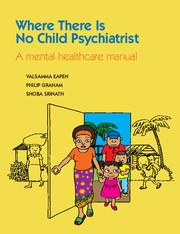Book contents
- Frontmatter
- Contents
- Preface
- Acknowledgements
- Abbreviations
- List of tables and boxes
- 1 Introduction
- 2 Assessment and treatment: general principles
- 3 Making a summary and action plan
- 4 Development and developmental problems
- 5 Intellectual disability
- 6 Habit disorders
- 7 Emotional problems
- 8 Behaviour and related problems
- 9 Specific problems in adolescence
- 10 Alcohol and drug dependency
- 11 Psychotic disorders
- 12 Chronic physical illness and disability
- 13 Physical illness without an identifiable physical explanation
- 14 Stressful situations
- 15 Parents and the needs of children
- 16 Mental health promotion
- 17 Medication
- References and suggested reading
- Appendix 1 My star chart
- Appendix 2 Guide to medication for use in childhood mental disorders
- Index
6 - Habit disorders
Published online by Cambridge University Press: 29 April 2024
- Frontmatter
- Contents
- Preface
- Acknowledgements
- Abbreviations
- List of tables and boxes
- 1 Introduction
- 2 Assessment and treatment: general principles
- 3 Making a summary and action plan
- 4 Development and developmental problems
- 5 Intellectual disability
- 6 Habit disorders
- 7 Emotional problems
- 8 Behaviour and related problems
- 9 Specific problems in adolescence
- 10 Alcohol and drug dependency
- 11 Psychotic disorders
- 12 Chronic physical illness and disability
- 13 Physical illness without an identifiable physical explanation
- 14 Stressful situations
- 15 Parents and the needs of children
- 16 Mental health promotion
- 17 Medication
- References and suggested reading
- Appendix 1 My star chart
- Appendix 2 Guide to medication for use in childhood mental disorders
- Index
Summary
Habit disorders include:
• feeding problems for which there is no physical cause – the baby may refuse the breast or bottle, fail to suck, cry before or after feeds, have constipation or diarrhoea, vomit or appear to have abdominal pain. Later the young child may fail to thrive for non-organic reasons;
• sleep problems – the child may have difficulty settling at bedtime, may wake frequently during the night, or may wake very early in the morning and disturb the household. As a result of being awake some of the night, the child may be tired during the day. Much less commonly the child may sleep excessively during the day. There may be other problems related to sleep in the early years, such as sleep-walking, nightmares and night terrors;
• bladder and bowel problems, especially bed-wetting and soiling;
• tics and other movement disorders.
Feeding problems
Case 6.1
Benjamin is a 2-year-old boy brought by his grandmother to the clinic because he has been refusing to eat his food from the first few weeks of life. The grandmother explains that Benjamin's mother is lying in bed – she has difficulty in getting up in the morning. There is no father in the home. Benjamin is apathetic when he is presented with food and turns his head away. He seems to prefer to watch the television. His development is a little delayed. He is walking well, but is only saying a few single words. When he is weighed and measured, he is below the second centile in both height and weight. The food supply in the area is more than adequate. What should the health professional do?
Feeding problems in the first 3 months of life
These are likely to be due to:
• exclusive breastfeeding: poor fixation or breast sepsis or maternal illness, especially HIV infection, tuberculosis, depression and chronic infectious disease
• too early introduction of complementary feeding, leading to infection or inadequate calorie intake
• illness in the child such as neonatal tetanus, pertussis and other congenital abnormalities.
Where there is enough food in a locality, there are other reasons for feeding problems in young infants.
- Type
- Chapter
- Information
- Where There Is No Child PsychiatristA Mental Healthcare Manual, pp. 34 - 51Publisher: Royal College of PsychiatristsPrint publication year: 2012
- Creative Commons
- This content is Open Access and distributed under the terms of the Creative Commons Attribution licence CC-BY-NC-ND 4.0 https://creativecommons.org/cclicenses/



